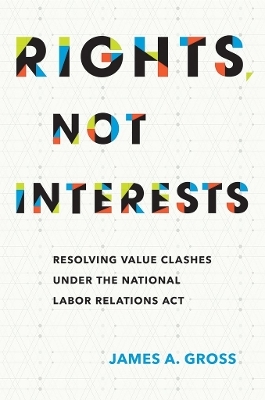
Rights, Not Interests
Resolving Value Clashes under the National Labor Relations Act
Seiten
2017
Cornell University Press (Verlag)
978-1-5017-1425-2 (ISBN)
Cornell University Press (Verlag)
978-1-5017-1425-2 (ISBN)
This provocative book by the leading historian of the National Labor Relations Board offers a reexamination of the NLRB and the National Labor Relations Act (NLRA) by applying internationally accepted human rights principles as standards for judgment. These new standards challenge every orthodoxy in U.S. labor law and labor relations. James A...
This provocative book by the leading historian of the National Labor Relations Board offers a reexamination of the NLRB and the National Labor Relations Act (NLRA) by applying internationally accepted human rights principles as standards for judgment. These new standards challenge every orthodoxy in U.S. labor law and labor relations. James A. Gross argues that the NLRA was and remains at its core a workers’ rights statute.
Gross shows how value clashes and choices between those who interpret the NLRA as a workers’ rights statute and those who contend that the NLRA seeks only a "balance" between the economic interests of labor and management have been major influences in the evolution of the board and the law. Gross contends, contrary to many who would write its obituary, that the NLRA is not dead. Instead he concludes with a call for visionary thinking, which would include, for example, considering the U.S. Constitution as a source of workers’ rights. Rights, Not Interests will appeal to labor activists and those who are trying to reform our labor laws as well as scholars and students of management, human resources, and industrial relations.
This provocative book by the leading historian of the National Labor Relations Board offers a reexamination of the NLRB and the National Labor Relations Act (NLRA) by applying internationally accepted human rights principles as standards for judgment. These new standards challenge every orthodoxy in U.S. labor law and labor relations. James A. Gross argues that the NLRA was and remains at its core a workers’ rights statute.
Gross shows how value clashes and choices between those who interpret the NLRA as a workers’ rights statute and those who contend that the NLRA seeks only a "balance" between the economic interests of labor and management have been major influences in the evolution of the board and the law. Gross contends, contrary to many who would write its obituary, that the NLRA is not dead. Instead he concludes with a call for visionary thinking, which would include, for example, considering the U.S. Constitution as a source of workers’ rights. Rights, Not Interests will appeal to labor activists and those who are trying to reform our labor laws as well as scholars and students of management, human resources, and industrial relations.
James A. Gross is Professor of Labor Relations, Law, and History at the ILR School, Cornell University. He is the author of A Shameful Business and editor of Workers’ Rights as Human Rights, both from Cornell.
Introduction
1. From Wagner to Taft-Hartley
2. Conflicting Statutory Purposes
3. The Gould Board
4. Gould Board Decisions and Workers’ Rights
5. The Battista Board
6. The Liebman Board
Concluding Comments
Notes
Index
| Erscheinungsdatum | 03.02.2018 |
|---|---|
| Verlagsort | Ithaca |
| Sprache | englisch |
| Maße | 152 x 229 mm |
| Gewicht | 907 g |
| Themenwelt | Recht / Steuern ► Arbeits- / Sozialrecht ► Arbeitsrecht |
| Recht / Steuern ► EU / Internationales Recht | |
| ISBN-10 | 1-5017-1425-2 / 1501714252 |
| ISBN-13 | 978-1-5017-1425-2 / 9781501714252 |
| Zustand | Neuware |
| Informationen gemäß Produktsicherheitsverordnung (GPSR) | |
| Haben Sie eine Frage zum Produkt? |
Mehr entdecken
aus dem Bereich
aus dem Bereich
mit Wahlordnung | Handkommentar
Buch | Hardcover (2024)
Franz Vahlen (Verlag)
CHF 132,95
mit den wichtigsten Bestimmungen zum Arbeitsverhältnis, …
Buch | Softcover (2024)
dtv Verlagsgesellschaft
CHF 19,45


